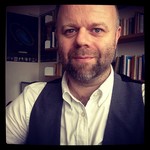Interim.
Some thoughts between the headlines.
Interim: Some thoughts between the headlines, November 13, 2015
I have just returned from the German Studies Association of Ireland meeting at NUIG (Galway), which ran 13-14 November. There we had a fascinating lead panel dedicated to Islam in German culture: I opened the proceedings talking about how different discourses in German language culture had constructed ambivalent models of how Germans and Muslims were ‘similar’ in various ways from 1770-1918; my colleague Rachel Magshamhráin from UCC (Cork) focussed on the omni-directional forms of Orientalizing that crisscrossed media and political discourses in Germany and the Ottoman Empire around the time of the Armenian genocide, whilst Joe Twist (Manchester) took a close and critical look at the failings of so-called enlightened models of cosmopolitan co-existence for Muslims and non-Muslims as they were presented in contemporary German theatre. The panel sparked fascinating discussions that had to be halted in order for the wider conference programme to continue. It felt like a great success. That night in our hotel rooms, however, we watched the horrific news from Paris unfold on our various screens. It felt as if our earlier discussions had been either remote, self-serving, even a failure, or, if not a failure, then horribly prescient: at least one of our key themes had been the inherent fragility of the ideals of intercultural and interfaith coexistence that thinkers and writers come up with, both historically and today.
I am painfully aware of what a difficult topic this is to navigate and to write about, without sounding trite, partisan, or offending one person or another. To be certain: very few people, save IS adherents themselves, could have anything good to say about the horrendous violence in Paris over the weekend, and we have seen worldwide condemnation in many forms, across mainstream and social media. Politicians and publics have united in the expected and in many ways wholly necessary denouncement of the attacks, with countless Muslim groups at pains to disassociate themselves from the violence. There have been, of course, more overtly ideological stances – take, unsurprisingly, the right wing media. In the UK, the Sun newspaper, for instance, today highlights that the recovery of a Syrian passport found near to the body of a dead suicide bomber in Paris and asserts that he came aboard on a refugee boat on the shores of Lesbos earlier this year: whatever the truth of this story, this branch of the media is trying to fan the flames of anti-immigration feeling in writing like this. To add to this, though, are the many voices calling for us to widen our sense of shock and extend our condemnation to include the civilian casualties of last week’s suicide bombings in Beirut, or recall (and contrast the media representations of) the shooting of 147 people at a Kenyan university campus back in April of this year. Here, the underlying objection, of course, is that we give more time and attention to the horrors endured by ourselves or our near neighbours, than by our distant others.
In looking at these examples, however briefly, my sympathies might appear clear enough. In writing today, though, I am not aligning myself explicitly with any one position. I am reflecting more on how I can respond, if at all, as someone involved in historical research, and as someone seeking to make that research speak to diverse communities today. In following diverse pathways of commentary along various media flows some of them sane, others insane, some humane other inhumane, I have been reminded of how what we have to say about the suffering of others can reflect our own needs, beliefs and agendas, often crudely, and not always for the better. I am not, today, going to try and hang my work off the events of the weekend, or last week. Friends and colleagues reassure me, this morning, that the public thrust to my work remains not only relevant, but, arguably, more crucial than ever. I will do my best to see them proven right, and I will certainly continue my efforts. Whilst I interrupted writing another far-longer blog entry to write this interim piece, normal service will soon be restored: this week I will be taking part in a public discussion in Woking alongside Baroness Warsi and Revd. Andrew Watson, Bishop of Guildford on the value of faith differences in contemporary UK society. I hope that discussion, and in its own humble way my work generally, will prompt audiences to reflect not only on what they think of Islam and Muslims, but to think critically about the forces shaping those views, and about how they communicate them at this most sensitive of times.
a UK academic exploring Islam through global history and culture.
